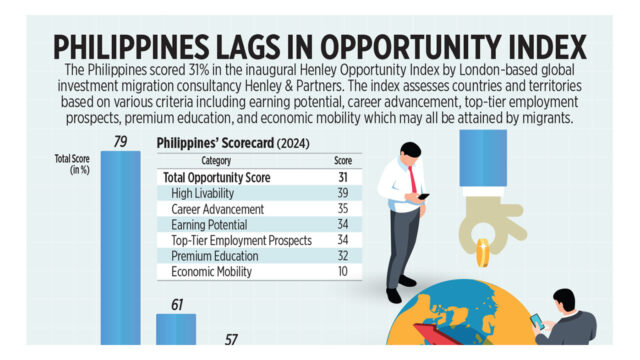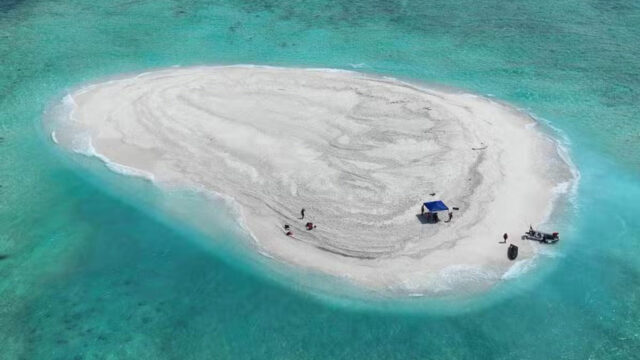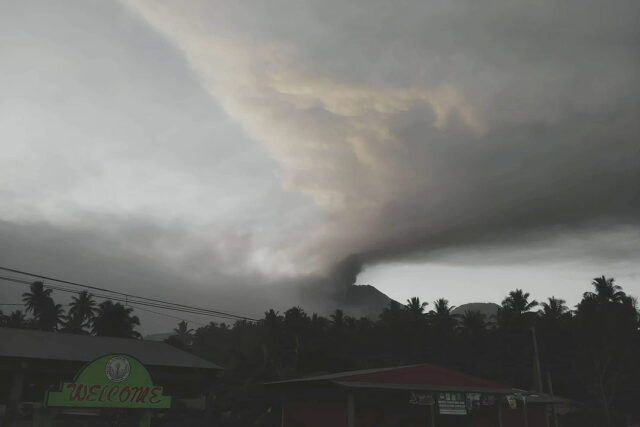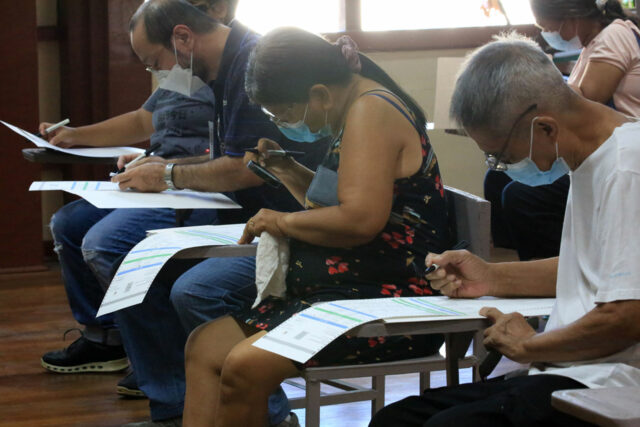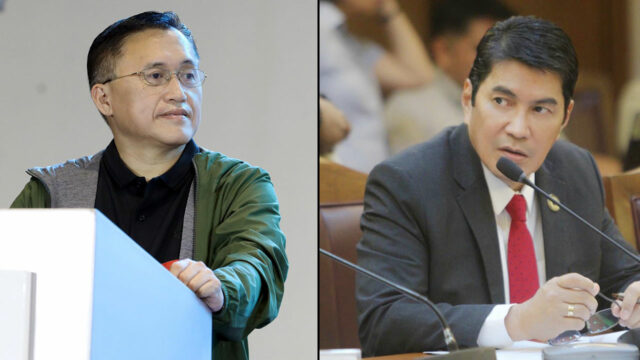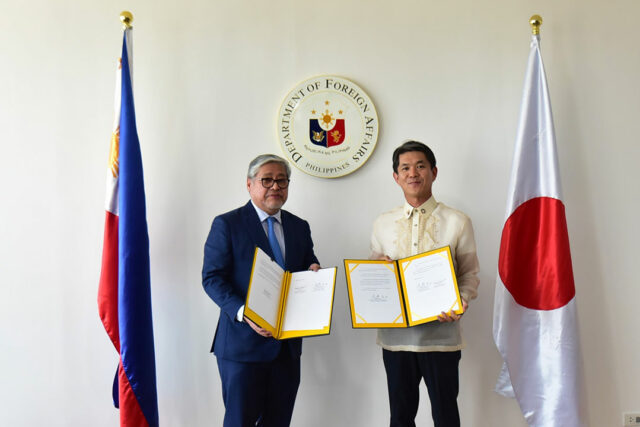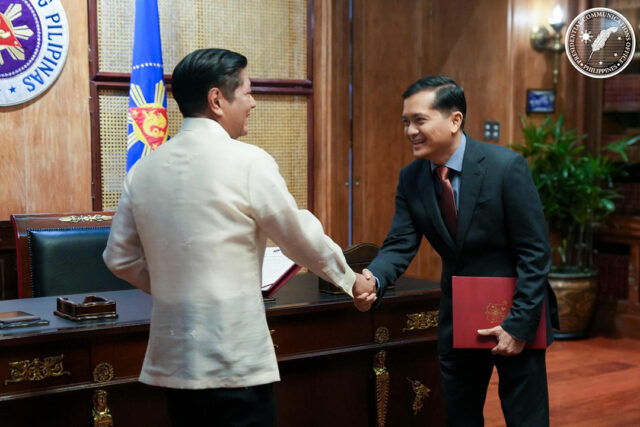Philippines lags in Opportunity Index
The Philippines scored 31% in the inaugural Henley Opportunity Index by London-based global investment migration consultancy Henley & Partners. The index assesses countries and territories based on various criteria including earning potential, career advancement, top-tier employment prospects, premium education, and economic mobility which may all be attained by migrants.
Philippines says China aircraft carrier did flight deck operations near coast
By Kenneth Christiane L. Basilio and Adrian H. Halili, Reporters
THE Philippine Navy on Monday said a Chinese aircraft carrier that it spotted near its northern coast practiced take-off and landing drills, probably in response to military exercises between the Southeast Asian nation and treaty ally the US under their annual Balikatan (shoulder-to-shoulder) war games.
The Chinese Shandong-class aircraft carrier, escorted by a warship, carried out flight deck operations about 123 nautical miles (228 kilometers) off Ilocos Norte province on April 25, Philippine Navy spokesman Rear Admiral Roy Vincent T. Trinidad told a news briefing on Monday.
“The presence of the Shandong carrier battle group is in response to what is happening between the Armed Forces of the Philippines (AFP) and other partner countries for Balikatan,” he added.
The Philippine Navy last week monitored the Chinese aircraft carrier, six escort ships and a spy ship sailing in the Luzon Strait, where Philippine and US forces are conducting week-long military exercises that feature an advanced US anti-ship missile system.
The military drills are being held in Philippine areas facing regional hotspots such as the South China Sea and Taiwan. They involve more than 14,000 troops from 20 nations and will run until May 9.
Started in 1991, the Balikatan exercise has evolved into Southeast Asia’s premier combat rehearsal as the Philippines and the US seek to strengthen security cooperation and enhance force interoperability in response to China’s growing assertiveness in the region.
The US last week deployed its Nimitz aircraft carrier group to the Philippine Sea, where it is practicing day and night flight operations and testing its ability to rapidly deploy military jets in various weather conditions, according to the US Indo-Pacific Command.
Also on Monday, the Philippine military said it held an air defense capability training in Zambales province at the weekend where advanced weapons such as ground-based air defense systems were deployed.
The Philippines’ Spyder air defense system and US Marine Air Defense Integrated System shot down several air drones in the Naval Education, Training and Doctrine Command base in the province facing the South China Sea.
“During the exercise, AFP and US personnel collaborated to sense and engage targets,” it said in a statement. “These systems are designed to detect airspace intrusions and enhance overall force protection for both Philippine and US units.”
PEDDLING ‘LIES’
Meanwhile, the Philippines denied reports that said Beijing had seized control of a disputed reef in the South China Sea.
“There is no truth whatsoever to the claim of the Chinese Coast Guard that the Pag-asa cays have been seized,” National Security Council spokesperson Jonathan E. Malaya separately told a news briefing, using the Philippine name for Sandy Cay Reef. “The facts on the ground do not support this statement coming from the Chinese Coast Guard.”
The Chinese Embassy in Manila did not immediately reply to a Viber message seeking comment.
Chinese state media last week reported that the Chinese Coast Guard had asserted sovereignty over the Sandy Cay — a small coral reef west of Thitu Island (Pag-asa Island) on the northern side of Thitu Reefs of the Spratly Islands — by landing and displaying China’s national flag on the sea feature.
The Philippines has been occupying Thitu Island, where it has a military outpost and where a small community of Filipinos lives, since 1971.
Mr. Malaya urged Beijing to refrain from escalating tensions in the already volatile waters by claiming unoccupied features.
“It is not to the benefit of any nation if these things are happening, nor is it to the benefit of any nation if such irresponsible announcements and statements are released to the public,” he said.
“We urge the People’s Republic of China and the Chinese Coast Guard to maintain the status quo in the West Philippine Sea, consistent again with the 2002 Declaration of Conduct,” he added, referring to parts of the South China Sea within the nation’s exclusive economic zone.
Senator Ana Theresia “Risa” N. Hontiveros-Baraquel urged the Foreign Affairs department to file a diplomatic protest over China’s alleged incursion into Sandy Cay.
“Our government should take appropriate action to safeguard our claim,” she said in a statement. “If we don’t, this might even undermine our presence on Pag-asa Island.”
Foreign Affairs spokesperson Ma. Teresita C. Daza did not immediately reply to a WhatsApp message seeking comment.
The senator also called on the Philippine Coast Guard to intensify its joint patrols over the area. “China’s unacceptable behavior not only violates international law, it also further keeps Filipino fisherfolk away from waters they should have access to.”
“The photoshoot gimmick and supposed planting of the Chinese flag on Sandy Cay is just another spectacle orchestrated by Beijing. No self-respecting state would take it to mean that China now has sovereign rights over it,” she added.
She said Sandy Cay belongs to the Philippines and “no amount of island hopping by the Chinese Coast Guard will muddle the truth.”
Separately, Senator Jose “Jinggoy” P. Ejercito Estrada said the Sandy Cay incident is another attempt by China to “distort the reality” and “spread fake news.”
“We must stay vigilant and resolute in protecting our sovereignty and maritime rights,” he said in a statement. “I urge our relevant agencies to clarify the situation and ensure that any actions violating our territorial integrity are addressed the soonest possible time.”
Beijing and the Association of Southeast Asian Nations (ASEAN) have yet to finalize a code of conduct in the hotly contested sea decades after signing a nonbinding 2002 declaration, which called on parties to “exercise self-restraint in the conduct of activities that would complicate or escalate disputes and affect peace and stability” at sea.
The South China Sea has become a flashpoint in Southeast Asia as China continues to assert sovereignty over almost the entire sea, seen as a vital global trade route that is also believed to be rich in undersea gas and oil deposits.
Beijing has deployed an armada of coast guard vessels to protect what it considers its territory despite a 2016 arbitral tribunal ruling that voided its claim for being illegal.
Philippine Foreign Affairs Secretary Enrique A. Manalo last week said ASEAN and China are “politically committed” to finalize the proposed code of conduct next year, when the Philippines hosts the ASEAN.
Philippine Coast Guard spokesman Jay Tristan Tarriela accused China of peddling “lies” about claiming sea features.
“We can already observe how the Chinese government plans out their strategy,” he told the same briefing. “It always starts with a lie.”
“If we’re not going to counter the lie, they’re going to operationalize that lie and take possession of whatever narrative that they have,” he added.
PHL, New Zealand to sign visiting forces agreement
THE Philippines and New Zealand (NZ) are set to sign a status of visiting forces agreement this week, which will allow their militaries to set foot in each other’s territories, according to the Philippine Defense department, amid concerns about China’s increased assertiveness in the region.
Defense Secretary Gilberto C. Teodoro, Jr. and Defense Minister Judith Anne Collins would sign the military pact in Manila on Wednesday and reaffirm their commitment to advance Philippine-New Zealand relations, the agency said in a statement on Monday.
Ms. Collins traveled to the Philippines on Monday and will meet with Philippine President Ferdinand R. Marcos, Jr. and Mr. Teodoro during her visit, according to a statement posted on the New Zealand government’s website.
“It formally sets the legal framework for engagement between our respective militaries, better facilitating ongoing cooperation, activities and exercises in each of our territories,” she said.
“We are committed to reinvigorating our security relationships, to playing our part and working with regional partners such as the Philippines to uphold the international rules-based order,” she added.
The Philippines and New Zealand finalized the military agreement in February and aimed to sign the deal by the second quarter of this year.
The 1987 Philippine Constitution prohibits foreign militaries from establishing bases and entering the country without the approval of the Senate.
The Philippines, already bound by military agreements with the US and Australia, is pursuing closer security ties with allies amid tensions with China over disputed features in the South China Sea.
Philippine and Chinese forces have repeatedly sparred over competing claims in the sea, with tensions flaring around disputed maritime features such as the Spratly Islands and Scarborough Shoal.
Beijing has sought to expand its influence and project naval power beyond its region, with China’s navy making an unannounced voyage around Australia from February to March and conducting live-fire drills in the Tasman Sea — over 8,000 kilometers away from Hainan Island, China’s nearest major landmass — separating Australia and New Zealand. — Kenneth Christiane L. Basilio
Bulusan Volcano rumbles before erupting; ashfall hits six villages in Sorsogon
BULUSAN Volcano in Sorsogon province erupted on Monday, spewing an ash column that reached about 4,500 meters high, the local seismology agency said.
In a bulletin, the Philippine Institute of Volcanology and Seismology (Phivolcs) said the phreatic eruption occurred at 4:36 a.m. and lasted for 24 minutes.
“The event produced a bent plume that rose 4,500 meters above the crater before drifting west to southwest,” it said.
Phivolcs raised Alert Level 1 over Bulusan Volcano, which showed a slight increase in volcanic earthquake and steam activity.
Sporadic explosions from existing or new vents and an increase in the temperature of hot springs may also be reported.
Phivolcs said a pyroclastic density current descended from the volcano’s peak and traveled within 3 kilometers from the summit.
Ashfall was reported in the villages of Cogon and Bolos in Irosin town; Puting Sapa, Guruyan and Buraburan, in Juban; and Tulatula Sur in Magallanes.
The agency said about 53 volcanic earthquakes were recorded 24 hours before the eruption.
“Rumbling sounds were reported by local government officials approximately 15 minutes before the eruption and were recorded by infrasound sensors,” it said.
Phivolcs called on local governments to bar people from entering the 4-kilometer permanent danger zone and 2-kilometer extended danger zone amid possible ballistic projectiles, rockfall, avalanches and ashfall.
“Communities that experience ashfall must take all necessary precautions and use protective masks or wet cloth to prevent ash inhalation,” it said.
The agency called on those living within valleys and along rivers to watch out for sediment-laden stream flows and lahar in case of heavy and prolonged rainfall.
The Civil Aviation Authority of the Philippines (CAAP) issued a notice to airmen alerting pilots about the dangers of flying near Bulusan Volcano effective until April 29.
“Flight operators are advised to avoid flying near the volcano due to possible hazards from sudden explosive eruptions,” it said in a statement.
Election Chairman George Erwin M. Garcia in a statement said the eruption of Bulusan Volcano had not disrupted the province’s preparations for the May 12 midterm elections.
He said election officers had been ordered to formulate a contingency plan should volcanic activity escalates. They were also ordered to coordinate with local governments, Phivolcs and the Department of Education. — Adrian H. Halili
Duterte spokesman indicted for human trafficking
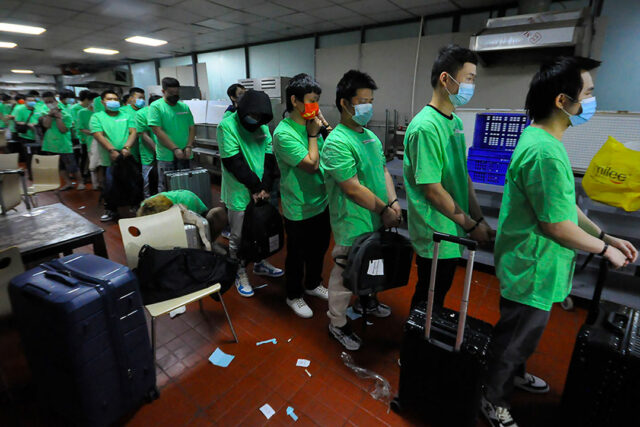
GOVERNMENT prosecutors have indicted former Philippine President Rodrigo R. Duterte’s spokesman for human trafficking due to his alleged link to an illegal Philippine Offshore Gaming Operator (POGO) that authorities raided in Pampanga province last year.
Former presidential spokesman Herminio “Harry” L. Roque was charged with qualified human trafficking before an Angeles City regional trial court, Justice Undersecretary Nicholas Felix L. Ty told reporters on Monday.
Also charged were Katherine Cassandra Li Ong, a representative from POGO Lucky South 99, and 48 others.
“Our theory here in the Porac, [Pampanga] case is not new… Section 4L of the Qualified Trafficking in Persons Act really happened there,” Mr. Ty said in Filipino. The Department of Justice (DoJ) filed the case before the court in Pampanga on April 28, he added.
The prosecutor said Mr. Roque had lobbied for the renewal of the POGO’s license before the Philippine Amusement and Gaming Corp. “So you can clearly see that he was really involved in the founding and organizing of this illegal POGO where human trafficking took place.”
Mr. Roque, who is in The Netherlands seeking asylum, said he would include his indictment as part of his application.
“I will include this latest charge in my application for asylum as a victim of political persecution owing to my loyalty to the Dutertes,” he told reporters in a Viber group chat. “This is not flight as evidence of guilt but the exercise of a human right to asylum.”
He said the charges had been fabricated, noting he was not initially included in the case against Ms. Ong and the others.
The former human rights lawyer said there is no evidence linking him to crime, describing his role only as a legal counsel for Whirlwind Corp. in a separate ejectment case. Whirlwind owned the land where Lucky South stood.
Ferdinand S. Topacio, Ms. Ong’s lawyer, declined to comment since he had not read the DoJ resolution.
President Ferdinand R. Marcos, Jr. banned POGOs last year, citing their links to criminal syndicates involved in human trafficking, fraud and money laundering. — Chloe Mari A. Hufana
DFA supporting efforts to counter ‘influence operations’
THE Department of Foreign Affairs (DFA) takes any indication of foreign interference and malign influence operations seriously and supports all efforts by national security and law enforcement agencies to counter them, it said on Monday.
The statement came after Philippine President Ferdinand R. Marcos, Jr. last week ordered an investigation into alleged foreign interference in next month’s midterm elections after a top security official’s warning that Chinese state-sponsored groups may be attempting to influence the outcome.
 China has rejected the accusations.
China has rejected the accusations.
Some 68.4 million Filipinos will be electing 12 senators, hundreds of members of the House of Representatives, and thousands of local government officials on May 12.
The Commission on Elections (Comelec) on Monday kicked off the three-day local absentee voting (LAV) for almost 58,000 voters. It will run until April 30, 5 p.m.
Absentee voters include members of the Armed Forces of the Philippines (AFP), the Philippine National Police (PNP), and media practitioners whose duty falls on election day.
“This is the first time LAV is automated. That means there are no machines at every location where local absentee voters will vote,” Chairman George Erwin M. Garcia told reporters in Filipino.
He added that the ballots of local absentee voters will be safely kept inside sealed envelopes, which will be opened on the evening of May 12, the election day.
All ballots will simultaneously be fed into machines in the Comelec’s main office on May 12.
The Commission is expecting an 80% voter turnout for this year’s absentee voting, similar to the turnout during the 2022 presidential elections.
Comelec earlier opened the month-long voting period for 1.2 million overseas voters, with 77 out of 90 Philippine diplomatic posts participating in the first-ever internet voting for the 2025 midterm elections. At least 16 posts will still be using automated counting machines (ACMs).
Comelec reported that an average of 10,000 overseas voters have cast their ballots daily through internet voting since April 13.
Several overseas Filipino voters have raised their concerns on social media about alleged changes to their votes after scanning the QR codes on their ballots.
The Comelec, however, assured the public there was no electoral fraud, clarifying that the list of names voters saw after casting their ballots through the Online Voting and Counting System was part of the system’s encrypted scripts, not a display of the candidates they voted for. — Chloe Mari A. Hufana with Reuters
Go, Rep. Tulfo lead election poll
REELECTIONIST Senator Christopher Lawrence “Bong” T. Go and Party-list Rep. Erwin T. Tulfo led the recent pre-election survey by pollster Octa Research, remaining as front runners for this year’s midterm elections.
In a statement on Monday, the pollster said that six of 10 Filipinos would vote for Mr. Go and Tulfo, tying for first and second place in the April survey.
 At least 19 Senate candidates are statistically favored to win this year’s midterm elections, it said, adding that Bienvenido T. Tulfo (45.4%), former Senate President Vicente C. Sotto III (43.3%), Senator Ronald M. dela Rosa (40.4%), former Senator Panfilo M. Lacson (39.7%), and Senator Pilar Juliana S. Cayetano (39.5%) followed the two election front runners.
At least 19 Senate candidates are statistically favored to win this year’s midterm elections, it said, adding that Bienvenido T. Tulfo (45.4%), former Senate President Vicente C. Sotto III (43.3%), Senator Ronald M. dela Rosa (40.4%), former Senator Panfilo M. Lacson (39.7%), and Senator Pilar Juliana S. Cayetano (39.5%) followed the two election front runners.
About four in 10 Filipinos said they’d vote for Senator Ramon B. Revilla, Jr., and is followed by Senator Lito M. Lapid (36.9%), Makati City Mayor Mar-len Abigail S. Binay (35.7%), and former Senator Paolo Benigno A. Aquino IV (32.3%).
Moreover, three in 10 Filipinos said they’d support Las Piñas Rep. Camille A. Villar, and former Senators Emmanuel D. Pacquiao, Sr. and Francis Pancratius “Kiko” N. Pangilinan.
About 28% of voters said they also back Wilfredo B. Revillame, former Interior and Local government Secretary Benjamin D. Abalos, Jr., and Senators Maria Imelda Josefa Remedios “Imee” R. Marcos and Francis N. Tolentino, tying for the 11th to 19th spots. Phillip Mikael R. Salvador completed the 19 statistically favored candidates, with two in 10 Filipinos saying they’d support him.
“Most 19 personalities with a statistical chance of winning are affiliated with the Alyansa para sa Bagong Pilipinas (Alliance for a New Philippines) coalition,” the pollster said in a statement.
“In addition, one candidate is running under the Liberal Party, one under the Koalisyon ng Nagkakaisang Pilipino (Coalition of Unified Filipinos), three under Partido Demokratiko Pilipino and three are independent candidates,” it added. — Kenneth Christiane L. Basilio
Gov’t to monitor digital nomads
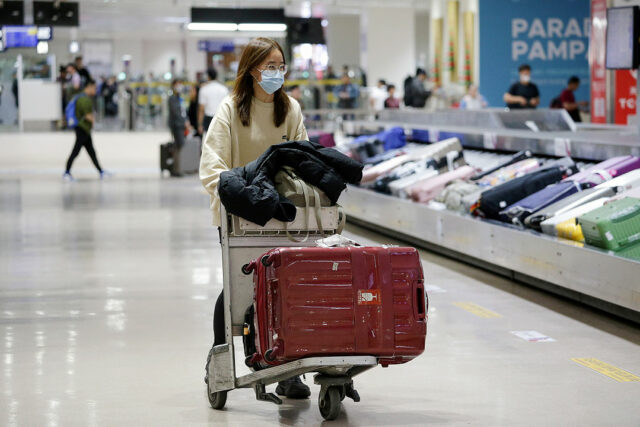
MALACAÑANG on Monday assured it will tighten the implementation processes of the newly signed executive order that grants visa to digital nomads, amid concerns that it could lead to issues similar with Philippine offshore gaming operators (POGOs).
“We will have monitoring,” Presidential Communications Office Undersecretary Clarissa A. Castro said in a news briefing. “Unlike with the POGOs before, we will be securing the processes regarding this. There will always be security features in order to protect our country from any scammers or any violations of the law.”
Last week, President Ferdinand R. Marcos, Jr., signed into law Executive Order No. 86, which authorizes the Department of Foreign Affairs to grant Digital Nomad Visas for foreign nationals seeking to temporarily reside and work remotely in the country.
According to Ms. Castro, the move will increase tourism and boost economic activities, benefiting the country.
“If we have more tourists, we will definitely have more income, and it will definitely also benefit the country and the Filipino people,” she said.
The Philippines last year banned all POGOs due to criminal activities. — Chloe Mari A. Hufana
Japan grants P150-M scholarship
THE Embassy of Japan in Manila on Monday said that it has issued grants worth P150 million to fund the advanced education of government employees planning to study in Japan.
In a statement, the embassy said that the grant would be used to fund “the master’s degree studies of 20 young Filipino government employees starting Academic Year 2026-2027 at leading universities in Japan.”
It added that the Project for Human Resource Development Scholarship is part of Japan’s support for the human resources development of the Philippines.
“It aims to enhance the expertise of Filipino professionals, enabling them to contribute further to national development,” the embassy said.
Japan has funded about 459 fellows from the Philippines as of 2024. — Adrian H. Halili
Palace press pushes back vs PCO
OFFICERS of the Malacañang Press Corps (MPC) have pushed back against what they see as an effort by the Presidential Communications Office (PCO) to limit newsrooms’ autonomy in assigning Palace reporters and the introduction of vague standards like “false reporting” that could be used to arbitrarily expel journalists at the expense of press freedom.
In a statement, the Palace’s reporters’ organization said the PCO’s five-year minimum requirement of existence for media entities and government coverage for reporters will affect the status of fledgling newsrooms and the deployment of young staffers.
MPC also cited that the PCO must clarify vague terms such as “false reporting,” which it can use to revoke a journalist’s accreditation to cover the Palace.
“The two sides agreed to work together to achieve a middle ground that will ensure the efficiency and integrity of the accreditation process while preserving the autonomy of the Palace reporters,” it added, noting the MPC officers met on Monday with PCO Secretary Jaybee C. Ruiz, a former television broadcaster.
The PCO requested the MPC to submit a position paper outlining their recommendations, with a deadline set for Friday, May 2.
In the meantime, the PCO deferred the planned submission period for accreditation requirements, originally scheduled for April 29 to May 2.
“The MPC will continue to vigorously promote the interests of its members, contribute to the strengthening of self-regulation among media groups, and stand by efforts promoting independent, critical, and ethical reporting,” MPC said. — Chloe Mari A. Hufana
VP’s silence fuels impeachment case, lawmaker says
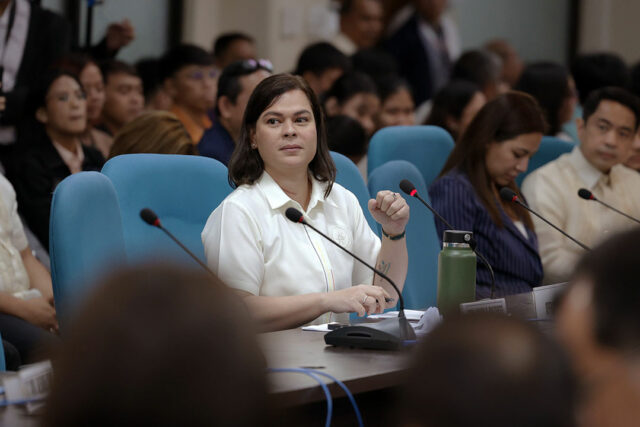
Vice-President (VP) Sara Duterte-Carpio’s silence on allegations of misusing secret funds would bolster the impeachment case against her, a congressman said on Monday.
“It seems she chose to remain silent because she knows explaining herself would be difficult,” Zambales Rep. Jefferson F. Khonghun said in a statement in Filipino. “The problem is, the longer she stays quiet, the deeper she gets entangled in the issue.”
The Office of the Vice-President did not immediately respond to an e-mail seeking comment.
The House of Representatives impeached Ms. Duterte in February, alleging secret fund misuse, unexplained wealth, acts of destabilization and plotting the assassination of President Ferdinand R. Marcos, Jr. and his family. The Vice-President has denied any wrongdoing.
More than 200 congressmen signed the impeachment complaint, which is more than one-third of the legal requirement before it could be sent to the Senate.
The Senate will convene as an impeachment court on July 30, once newly elected senators take their oath as impeachment judges, according to the chamber’s impeachment schedule. Senators will approve the trial rules on June 2, when Congress returns from a four-month break. — Kenneth Christiane L. Basilio




